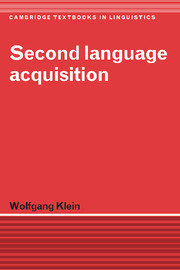Book contents
5 - The problem of analysis
Published online by Cambridge University Press: 05 June 2012
Summary
Trying to tackle the problem of analysis the learner may rely, on the one hand, on all of the knowledge, linguistic as well as nonlinguistic, which is currently available to him, and, on the other, on the structural properties of the input. These two components are examined in the first two sections of this chapter. The remaining three sections discuss some findings in language acquisition research which provide revealing insights into the problem of analysis.
The available knowledge
The knowledge a learner can utilize at any time to process the linguistic input falls into four categories:
(a) General knowledge about the nature of human languages and of verbal communication.
(b) Specific knowledge of the structure of his first language, or possibly of any other language he happens to know (the latter, as a special case, will be largely bypassed in our discussion).
(c) Knowledge of the target language which he has or presumes to have.
(d) All manner of nonlinguistic knowledge.
Before considering these types of knowledge in more detail, a word about the way the term ‘knowledge’ is used in this book is in order. It includes, firstly, both ‘conscious’ and ‘tacit’ knowledge; but it should also include ‘uncertain’ knowledge, that is, the learner's assumptions, of which he may be certain or uncertain at the time, which may however prove false or incomplete at a later stage.
- Type
- Chapter
- Information
- Second Language Acquisition , pp. 63 - 78Publisher: Cambridge University PressPrint publication year: 1986



